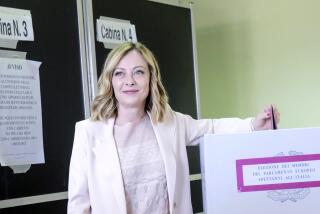Leader Wraps Self in Mantle of State
- Share via
ZAGREB, Croatia — Running as an opposition candidate against a popular, authoritarian president has its disadvantages.
But Vlado Gotovac, of the opposition Croatian Social-Liberal Party, hardly expected to be beaten up as he stood on stage during a campaign rally last week. The culprit was a member of President Franjo Tudjman’s elite guard, who shouted homage to one of Croatia’s past fascist leaders as he beat Gotovac, causing a concussion.
“Long live Ante Pavelic!” cried the 26-year-old army captain, referring to the head of Croatia’s Nazi puppet state, which killed hundreds of thousands of Serbs, Jews and others during its World War II reign.
Croatia votes in presidential elections Sunday, and no one expects anyone but Tudjman to win. Opposition candidates such as Gotovac tilt at windmills, grope for political space and, through their difficulties, illustrate the state of democracy--and lack thereof--in this country that aspires to join the West.
Tudjman, 75, and said to be suffering from terminal cancer, will be reelected to a five-year term that he will most likely not live to complete, diplomats say. The onetime Communist general turned nationalist, who guided Croatia to independence from the former Yugoslav federation in 1991, has used recent years to spread the power of his Croatian Democratic Union party, or HDZ, through layers of the state economy and society. Now, his family, friends and party loyalists hold important posts in most companies and industries.
He and his cronies control most electronic media, and strict libel laws inhibit a free press, watchdog groups say; two journalists from an independent weekly are on trial for “insulting” Tudjman.
Control of the media also inhibits a democratic electoral process, activists say. According to a survey conducted by the Croatian Helsinki Committee for Human Rights during the three weeks leading to April 13 parliamentary elections, HDZ received more than 50% of air time on two main news broadcasts, while about 2% went to the party with the second-largest amount of coverage.
On Sunday, Tudjman rode triumphantly on a train into Vukovar, the city that was heavily shelled at the start of the war between Croatia and the former Yugoslav federation. Television covered Tudjman’s visit live for six hours.
Vukovar will stay in Serbian hands until later this year, when it and a chunk of Croatia known as Eastern Slavonia will gradually be restored to Zagreb’s control. Tudjman’s government is under pressure from the U.S. to reverse its abuse of minority Serbs and protect those Serbs in Eastern Slavonia who want to remain there or return to their homes elsewhere in Croatia.
As he has in past elections, Tudjman equates himself with the very nationhood of Croatia. His billboards say simply: Tudjman. Croatia’s president. And posters say: Tudjman, not the Balkans. That is, a vote for Tudjman is a vote for Croatia’s escape from its bloody Balkan neighbors and for union with Western Europe.
It works. Many Croatians cannot imagine anyone but Tudjman as president. And that is the notion Gotovac and the only other opposition candidate, Zdravko Tomac, battle.
“There has been a very serious identification of [Tudjman’s party] and the state,” said Ivan Grdesic, assistant dean for political science at the University of Zagreb. “Giving up the party means Croatia disappears as a state.”
This sterile political environment also means that there has been little real campaigning. There is no discussion of issues. The opposition does not dare talk about Croatia’s high unemployment. And treatment of minority Serbs does not come up, unless a reporter asks.
Instead, Gotovac and Tomac talk about their vision of Croatia.
Tomac, a legislator from the Social Democratic Party, which includes many of Croatia’s former Communists, has run an everyman’s campaign, crisscrossing the country in a van and telling small groups he wants a true democracy, a people’s state that challenges the “wild capitalism” bringing wealth to the few.
Gotovac, a poet who was imprisoned as an anti-Communist dissident in the 1970s, is recovering from his concussion. At his closing rally Wednesday, in Zagreb’s central square, he assured several thousand people that they can build a democratic Croatia that goes beyond one-man rule.
“Who says they are better Croats than we are?” he called to the crowd. “They cannot stop us from building a different Croatia, the one you are dreaming of. We will restore morality and independent opinion to Croatia, and dignity to the government. The destiny of Croatia will no longer depend on one man.”
More to Read
Sign up for Essential California
The most important California stories and recommendations in your inbox every morning.
You may occasionally receive promotional content from the Los Angeles Times.











